WANA (Oct 04) – Iran’s Defense Minister, Amir Aziz Nasirzadeh, downplayed media speculation about an imminent war following recent U.S. military movements in the region, calling such reports part of a deliberate “cognitive war” and reiterating that Iran’s armed forces are fully prepared to defend the country.
Speaking in a televised interview, Nasirzadeh said transporting ships and equipment “is not new” and has been seen repeatedly over decades. “As the military, we must always be ready to defend the country.
That is a basic principle and is unrelated to routine troop movements,” he said, adding that civilian sectors should not be swayed by psychological operations tied to these maneuvers and must continue economic and social life.
He warned that modern conflict blends hard and soft methods, with the soft—“cognitive war”—now prominent. “They keep saying ‘an attack will happen’ to create problems for society, raise inflation, and undermine economic stability. People should be aware of this cognitive war,” Nasirzadeh said.
He stressed that if war is imposed on Iran, the military’s duty is to defend the nation, and Tehran is prepared to do so, citing Iran’s performance in a recent 12-day conflict as an example of forcing the enemy to accept a ceasefire.
Nasirzadeh also criticized what he described as the current U.S. approach to peace. “The U.S. government has put forward the idea that ‘peace through power’ gives peace meaning — that by using force it can force everyone to surrender,” he said.
He argued such coercion is not real peace but submission: “It means ‘I have power, I say it, you must do it.’ Free and developing countries will not accept that; the world has long rejected it.”
Referring to historical precedent, he noted the doctrine dates back to the era when U.S. leaders declared a unipolar world, but said today the claim is voiced more openly: “Now they say it more nakedly — ‘I have power, you must submit’ — and I doubt that will succeed.”
An anti-Israeli billboard is seen on a street, early hours of the ceasefire, in Tehran, Iran, June 24, 2025. Majid Asgaripour/WANA (West Asia News Agency)

